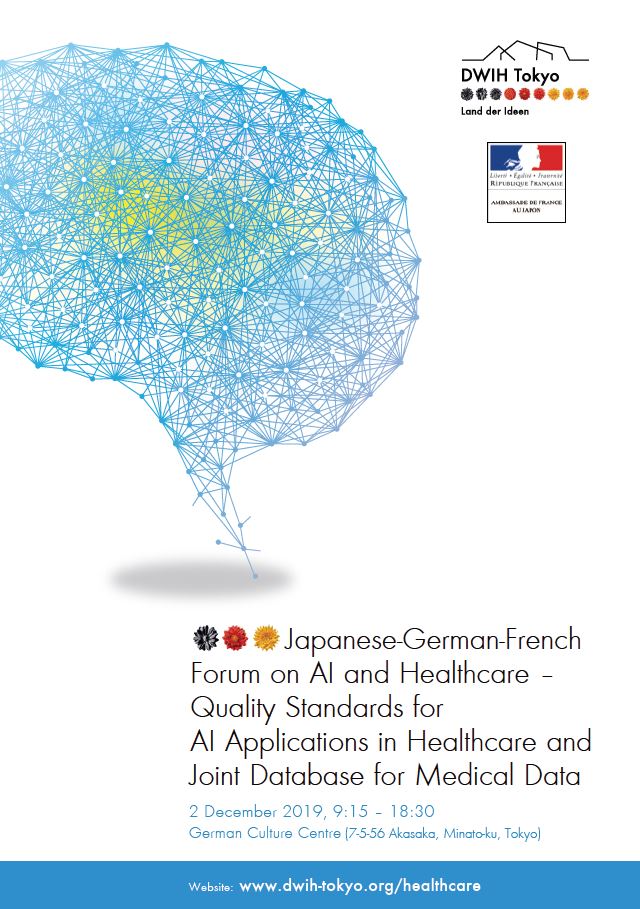Quality Standards for AI Applications in Healthcare and Joint Database for Medical Data
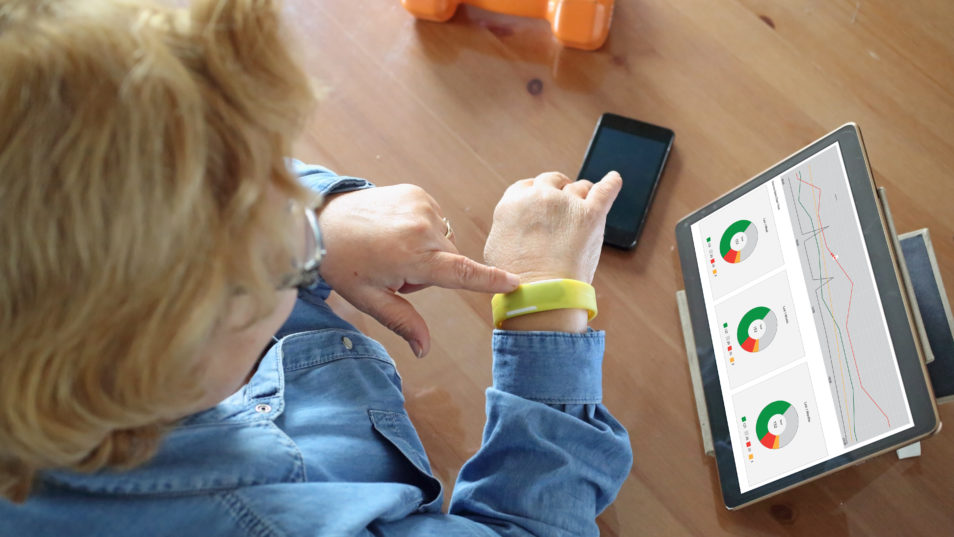 © iStock
© iStock
Event Information
December 2, 2019, 9:15 AM to 6:30 PM
German Culture Centre (OAG Haus) 1F, 7-5-56 Akasaka, Minato-ku, Tokyo 107-0052
Organizer(s): DWIH Tokyo, Embassy of France in Japan
With more than 130 participants from Japan, Germany and France, our trilateral forum on Artificial Intelligence and Healthcare in Tokyo was a great success. We would like to express our thanks to everyone for the great support!
You can find the following documentation material here:
- Report about the forum
- Interviews with the Chairs of the sessions, Prof. Dr. Klaus Juffernbruch and Dr. Kazuhiro Sakurada
- Photo gallery of the conference (©DWIH Tokyo)
- Video (livestream) of the forum
- Presentations (PDF for download embedded in the programme below)
We also publish the updates on the forum and recent media coverage on the DWIH Tokyo Twitter account.
AI in healthcare is expected to support the P4 medical approach of predictive, preventive, personalized and participatory treatment and to reduce time, back-office administration and financial burdens, consequently allowing for a more sustainable and affordable healthcare system. Quality assurance for AI applications in healthcare and integrated databases for medical data are steps on the way to improved health services.

In the trilateral forum, researchers, practitioners, entrepreneurs, regulators and policy makers discuss a guideline to quality assurance of AI applications in healthcare and exchange on national approaches to an integrated database of medical data. Following panel discussions involving experts from Japan, Germany and France, the audience will be able to participate in group work to jointly develop and reflect on related use cases.
The forum serves as a follow-up to Artificial Intelligence-International Research and Applications: 1st Japanese-German-French DWIH Symposium (November 2018), as well as being a step towards the implementation of the Joint Statement of Japanese-French-German Collaboration in Artificial Intelligence.
Organizer: German Centre for Research and Innovation Tokyo (DWIH Tokyo)
Co-organizer: French Embassy to Japan
Patronage: Federal Republic of Germany Foreign Office; Federal Ministry of Education and Research
Supported by: Ministry of Economy, Trade and Industry (METI), Official DWIH Tokyo partners from Germany
Language: English (Japanese interpretation available)
Speakers
Dr. Isabelle Adenot
Board Member, Chair for Medical Device and Health Technology Evaluation Committee, HAS (Haute Autorité de Santé)
Recognized as a leader community pharmacist (1983-2017) by her colleagues, Isabelle Adenot, before coming to HAS in 2017, was the President of the French Chamber of Pharmacists, the regulatory body for pharmacists in France (2009-2017) ; the Vice President of the International Pharmaceutical Federation (FIP) (2014-2017) ; the President of the International Conference of French Speaking Pharmacists’Chambers (CIOPF) (2009-2017). At a European level, she was involved, since 2003, in the activities of Pharmaceutical Group of the European Union, an organization representing over 400 000 community pharmacists in Europe. In 2012, she chaired that organization.
Throughout her mandates, she was very involved in the ethical implementation of new technologies in the health system.
Isabelle Adenot took part in a number of professional and scientific committees, including the board of ANSM (National French Agency for Security Medicines and Health Products). She is a member of the French National Academy of Pharmacy. She holds a distinction: « Chevalier de la Legion d’Honneur ».
Sophie de Bentzmann
Counselor, Embassy of France in Japan> Japanese-German-French Expert Workshop on AI and Healthcare, on 3 December 2019 (CLOSED workshop)
PD Dr. Thomas Bocklitz
Head of Department Photonic Data Science, Leibniz Institute of Photonic Technology (Leibniz-IPHT), Member of Leibniz Research Alliance Health Technologies
Thomas Bocklitz studied Physics at Friedrich Schiller University Jena and graduated with a doctoral degree in Chemistry from there in 2011. Since 2016 he also holds a habilitation degree in Chemistry. He is currently head of the IPC Junior Research Group “Statistical Modelling and Image Analysis” at the Friedrich Schiller University Jena & Leibniz-IPHT Working Group “Statistical Modelling and Image Analysis” at the Leibniz Institute of Photonic Technology (Leibniz-IPHT). Both groups are engaged in the adequate analysis of spectrometric, spectroscopic and image data. Furthermore, methods are being developed for the quantitative correlation of different measurement methods. Since 2018 he is the Leibniz-IPHT’s contact person for Artificial Intelligence and since 2019 he is heading the department “Photonic Data Science”.
Dr. Kiyoyuki Chinzei
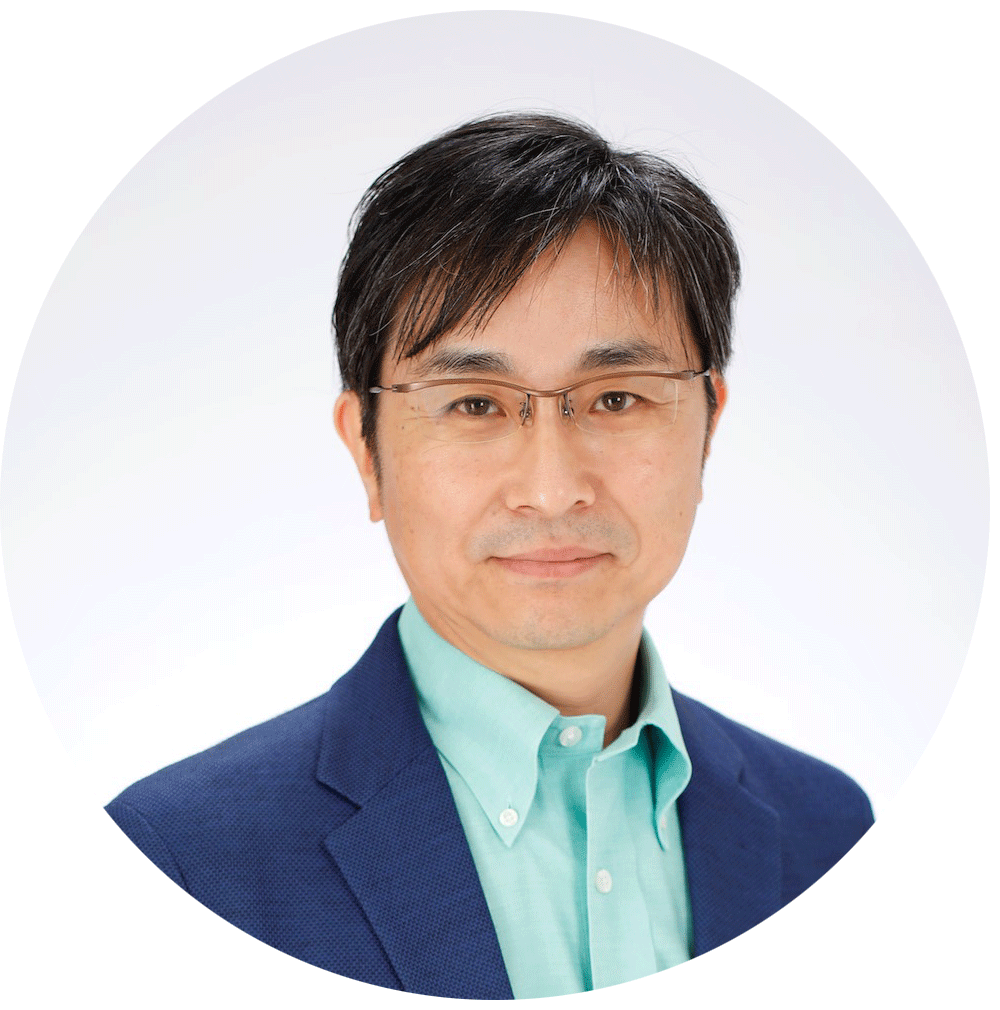
Deputy Director, Health Research Institute; Group leader, Interface Material Research Group at National Institute of Advanced Industrial Science and Technology (AIST); Adjoint Professor, School of Engineering, Tokyo Denki University
- since 2015: Deputy director, Health Research Institute of AIST
- 2014 – 2016: Adjoint Professor of Tokyo University
- since 2005: Adjoint Professor of Tokyo Denki University, Project leader of IEC/SC 62D/JWG 35 (Safety of surgical robot). Board member of Japan Society of Computer Aided Surgery (JSCAS), Science board member (2018-) of Pharmaceuticals and Medical Device Agency (PMDA) Japan.
- Research works in the fields of biomedical engineering including surgical robotics, MR (magnetic resonance) robotics, biomechanics for surgery, and regulatory science for medical devices.
Corinne Collignon
Deputy Head, Medical Device Assessment Department, French National Authority for Health, HTA Division
Corinne Collignon is a pharmacist. After a specialization in hospital pharmacy, she started her career at the French Agency for the Safety of health products before joining French National Authority for Health. She has now more than 15 years of working experience in the medical device sector and she leads a team in HAS in charge of assessing medical devices for the French National Medical Device and Health Technology Evaluation Committee. She and her team are specifically involved in developing methods to assess innovative technologies. They are currently working on topics linked to digital technologies (such as connecting medical devices (MDs), software as a medical device with artificial intelligence or machine learning).
Yoshihide Esaki
Deputy Director-General for Healthcare and Medical Policy, Ministry of Economy, Trade & Industry (METI); Ministry of Health, Labour and Welfare (MHLW); Cabinet Secretariat, Government of Japan
Yoshihide Esaki has been working on International Trade, Finance, IT, and Energy policy in the Ministry of Economy, Trade, and Industry (METI) in Japan for about 30 years. He also worked for European Commission DGⅢ from 1997 to 1998.
He has focused on healthcare and Medical policy including bio-industry policy for the last six years. He led a project about regulatory change of regenerative medicine in collaboration with Ministry of Health, Labor and Welfare.
He currently serves as Deputy Director-General for Healthcare and Medical Policy in METI and Cabinet Secretariat of Japanese Government and leads projects on precision medicine, preventive healthcare, and regenerative medicine.
He completed his B.A. in International Relations at the University of Tokyo and his M.A. in Contemporary European Studies at the University of Sussex in U.K.
Prof. Dr. Thomas Ganslandt
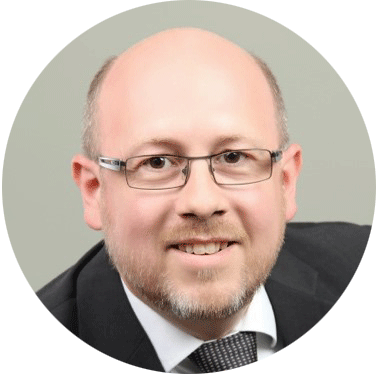
Executive Director of the Heinrich-Lanz-Center for Digital Health, Medical Faculty Mannheim of the Ruprecht-Karls-University Heidelberg; Speaker, Interoperability Working Group of the German Medical Informatics Initiative; Board Member, Technology and Method Platform for Networked Medical Research (TMF e.V.)
- since 2018: Professor for Medical Informatics, Medical Faculty Mannheim, Heidelberg University
- since 2018: Board Member of the German Telematics Platform for Networked Medical Research
- since 2017: Speaker of the Interoperability Working Group of the German Medical Informatics Initiative
- 2008 – 2018: Head of Research IT Infrastructure, Erlangen University Hospital
- 2003 – 2008: Researcher, Chair of Medical Informatics, University of Erlangen-Nuremberg
- 1998 – 2003: Physician & Medical Informatics Researcher, Muenster University Hospital
Prof. Dr. David Gruson
Health Director, Jouve; Founder, Ethik-IA; Health Chair SciencesPo Paris
Since 2002 David Gruson is involved in the field of healthcare policies. As former adviser for healthcare to the Prime Minister, he has been CEO of La Réunion University Hospital and CEO of the French Hospital Federation. He is now Director of Healthcare for Jouve, a French IT Group
Mr. Gruson has a PhD in Law and a Master in IT Technologies (French National School of Administration and the French National School for Public Health). Since 2008 he is member of the Board of the Sciences Po Paris Healthcare Chair and Associate Professor to the Paris-Descartes University. He teaches hospital management and healthcare IT policies.
In 2017, he promoted the Ethik IA Initiative. Federating a group of IT and healthcare scholars and professionals, this initiative put on the French national agenda the idea of AI Positive Regulation. It tackles the issues of the 2018 bioethics law reexamination and the impacts of AI on HR in the healthcare sector. Ethik IA presented in March 2017 the “5 keys for AI and robotisation Positive Regulation”, the first comprehensive set of soft regulations in that field. These proposals led to the enactment of the Algorithmic Human Warranty Principle within the framework of the Bioethics Law.
He has been appointed as a member of the WHO AI for Healthcare Regulation Task Force last September.
Julia Hagen
Director Regulatory & Politics, Health Care Innovation Hub by the Federal Ministry of Health , Germany; formerly Health and Pharma Lead at Bitkom Association
- May 2019-present: Director Regulatory & Politics, health innovation hub (Federal Ministry of Health Germany)
- Sep 2016–May 2019: Head of Health & Pharma, Bitkom (German Digital Business Association)
- Aug 2014–Jul 2016: Dual Degree Master of Public Administration Sciences Po Paris & London School of Economics (Regulating Technology & Public Governance)
- Apr 2013–Aug 2014: Policy Officer, European and International Affairs, French Federation of Local Public Services
Jan 2009 – Sep 2013: B.A. Public Management & Governance, Zeppelin University, Friedrichshafen, Germany
Hiroshi Iwamura
Director Japan, Germany Trade and Industry (GTAI)> 15th Japan-Germany Industry Forum: Artificial Intelligence in Healthcare – Trends and Business Opportunities, on 3 December 2019
Prof. Dr. Klaus Juffernbruch

Professorship for Health & Social Management, FOM University, President, Expert Group “Intelligent Networks in Health Care” at German National Digital Summit
- Since 8/2017: Professorship for Health & Social Management at FOM University
- Since 1/2012: President of Expert Group „Intelligent Networks in Health Care“ at German National Digital Summit
- 2016 – 2017: Lecturer at FOM University
- 2015 – 2017: Lecturer at Centre d’Études Internationales de la Propriété Intellectuelle (CEIPI) at University Strassburg
- 2007 – 2014: Director Strategy Consulting Health Care at Cisco Systems
- 1993 – 2007: Various Consulting, Sales and Management Positions at IBM
- 1991 – 1992: Physician at RWTH Aachen University Hospital
Prof. Dr. Veronika von Messling
Director General, Life Sciences Division, German Federal Ministry of Education and Research (BMBF)
Prof. Dr. Veronika von Messling, is Director General of the Life Science Division at the German Federal Ministry of Education and Research. She obtained her veterinary degree and her doctorate degree in veterinary virology from the Veterinary School Hannover, Germany. After postdoctoral training at Mayo Clinic in Rochester, MN, she was Assistant Professor at INRS-Institut Armand-Frappier in Laval, QC, and then Associate Professor at Duke-NUS Medical School, Singapore, before becoming Director of the Veterinary Division at Paul-Ehrlich-Institute, the German Federal Institute of Vaccines and Biomedicines, in Langen, Germany. Her expertise lies in the development of novel prophylactic and therapeutic strategies against infectious diseases.
Dr. Michihiko Minoh
Executive Director, RIKEN
- 2018-pressent: Executive Director, RIKEN
- 2010-2016:Chief Information Officer, Kyoto University
- 2010-2016:Director-General, Institute for Information
- Management and Communication, Kyoto University
- 2006-2010:Director, Academic Center for Computing and Media Studies, Kyoto University
- 1995-2018:Professor, Kyoto University
- 1989-1995:Associate Professor, Kyoto University
- 1983-1989:Assistant Professor, Kyoto University
Prof. Dr. Satoru Miyano
Head, Laboratory of DNA Information Analysis and of Laboratory of Sequence Data Analysis, Human Genome Center, Institute of Medical Science, The University of Tokyo; Sub-Program Director, AI Hospital
Prof. Dr. Miyano received the B.S. (1977), M.S. (1979) and PhD (1984), all in Mathematics from Kyushu University, Japan. He has been working in the field of Bioinformatics and joined Human Genome Center as a professor in 1996. His research mission is to develop “Computational Medical Systems Biology towards Genomic Medicine”, in particular, cancer research and clinical sequence informatics. He has been involved as PI with MEXT Scientific Research on Innovative Areas “Systems Cancer Project”, “Systems Cancer in Neodimension”, the International Cancer Genome Consortium, MEXT Large-Scale Data Analysis with K computer, and Post-K Computer Project. He is an ISCB Fellow 2013 (The International Society for Computational Biology: http://www.iscb.org/iscb-fellows). 2016 Uehara Award for cancer genomics.
Sirko Pelzl
CEO, apoQlar GmbH; Managing Director, theBlue.ai GmbH
- 2019 – now Founder & CEO, theBlue.ai GmbH
Management of the medical advisory board of the VSI in Hamburg - 2007 – 2017 Founder & CTO Apollogic Group
- 2017 – now Founder & CEO, apoQlar GmbH
- 2002 – 2017 Software Architect and Senior Developer, SAP – Philips, Sony, Audi, EON, Deutsche Telekom, Bosch, Deutsche Börse, Novartis
Eugene Satoshi Takagi
Founder and CEO, Bio-Xcelerator K.K.; CEO BCPlatform Japan
- 2001-present: CEO Bio-Xcelerator, CEO BCPlatform Japan
- 2017-2018: CEO Actmed
- 2001-2008: CEO Oxygenix
- 2001-2006: Founder BHP Partners
- 1983-1996 CEO Grelan Pharmaceutical (Aska Pharmaceutical)
Dr. Kazuhiro Sakurada

Deputy Program Director, Medical Science Innovation Hub Program, RIKEN
- 2008 – 2018: Senior Researcher, Sony Computer Science Laboratories Inc.
- since 2008: Chief Scientific Officer, iZumi Bio Inc.
- 2006 – 2007: Head of Global Drug Discovery Regenerative Medicine, Bayer Schering Pharma AG
- 2004 – 2006: Head of Research Center Japan (Member of Corporate Research Management Team), Schering AG
- 2000 – 2004: Principle investigator of Laboratory of Regenerative Medicine, Kyowa Hakko Kogyo Co. Ltd
- 1988 – 2000: Researcher, Kyowa Hakko Kogyo Co. Ltd
Dr. Lucas Witoslawski
Chief Operating Officer, German Chamber of Commerce and Industry in Japan (AHK Japan)> TechBIZKON III: Digital Health beyond 2020 – Connecting Start-ups, Corporates and VCs, on 4 December 2019
Dr. Ryuichi Yamamoto (cannot attend)
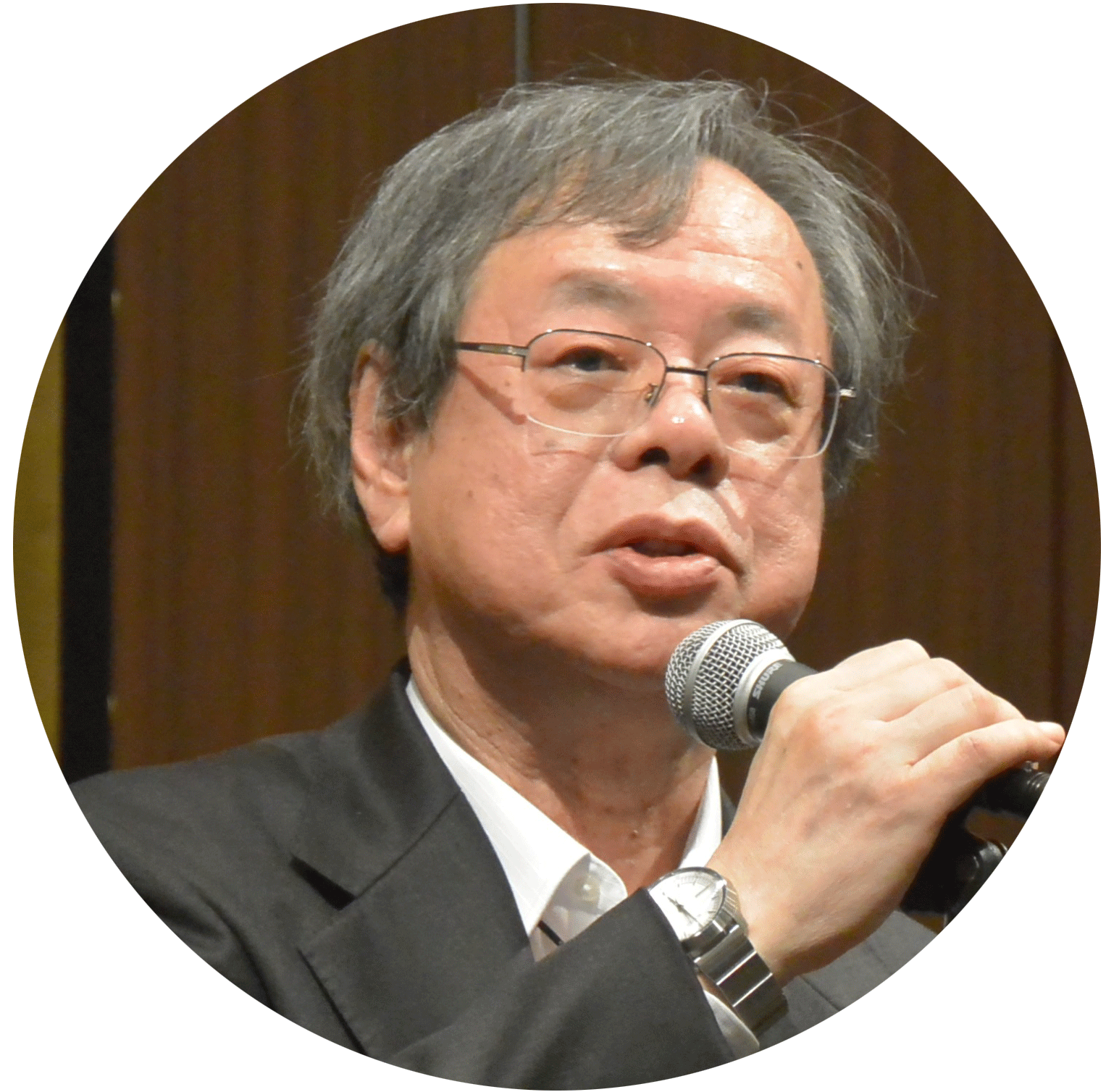
Chief Director of Medical Information System Development Center, Invited Professor of Jichi Medical University
- 1995-2003: Associate Professor of Medical Informatics, Osaka Medical College Hospital
- 2003-2014: Associate Professor of Interfaculty Initiative of Information Studies, Graduate School of the University of Tokyo
- 2013- : Chief Director of Medical Information System Development Center (General Foundation)
- 2014-2016: Associate Professor of Dept. Health Management and Policy, Graduate School of the University of Tokyo
- 2016- Invited Professor of Jichi Medical University
Prof. Dr. Hideo Yasunaga
Professor, Department of Clinical Epidemiology and Health Economics, The University of Tokyo
- 2014-now: Professor, Department of Clinical Epidemiology and Health Economics, The University of Tokyo
- 2008-2013: Associate Professor, Department of Health Management and Policy, The University of Tokyo
- 2011: Visiting Faculty, Department of Health Care Policy, Harvard Medical School
- 2003-2008: Research Associate, The University of Tokyo Hospital
- 2000-2002: Graduate Student (Public Health), Graduate School of Medicine, The University of Tokyo
1994-2000: Clinician, The University of Tokyo Hospital and other hospitals
Programme (Presentations)
| 09:15-10:15 | Opening
Welcome Plenary Speeches |
| 10:15-11:30 | Session I: Quality Standards for AI in Healthcare
“Developing a Guideline for Quality Standards” “AI-based SaMD and Medical Systems in Japan: Towards Social Acceptance” “Evaluation of Medical Devices Which Use Artificial Intelligence” “Regulating AI in Healthcare and Perspectives for Reimbursement” |
| 11:30-11:45 | Coffee Break |
| 11:45-13:00 | Session I: Quality Standards for AI in Healthcare (group work)
Working group 1: “Chances and Challenges of AI in a Hospital Setting” Working group 2: “AI in Clinical Trials” Working group 3: “e-Health: Big Data Mining for Personalised Care Path” |
| 13:00-14:00 | Lunch Break and Networking |
| 14:00-15:15 | Session II: Joint Database for Medical Data
“Deep Clinical Phenotyping for Predictive, Preventive and Personalised Medicine” “Benefits and Limitations of Large-Scale Health Databases in Japan” “Collaborative Approaches to Interoperable, Secure Medical Data Sharing” French Health Data Hub |
| 15:15-15:30 | Coffee Break |
| 15:30-16:45 | Session II: Joint Database for Medical Data (group work)
Working group 4: “Safe and Transparent Data Sharing System” Working group 5: “Vision of a Trilateral Database as a Base for Innovative Entrepreneur Designs” Working group 6: “Quality of Medical Data” |
| 17:00-17:30 | Group Work Snapshots Summary and highlights presented by moderators of group work
Sneak Preview “Connecting Europe and Japan – Intelligent Healthcare Applications”
|
| 17:30-18:20 | Closing Panel
Co-Chairs: Panelists: |
| 18:20-18:30 | Closing
Dorothea Mahnke, Director, German Centre for Research and Innovation Tokyo (DWIH Tokyo) |
Session I: Quality Standards for AI in Healthcare - Session outline and abstracts
Session Outline:
As Artificial Intelligence is maturing an increasing number of systems is making the transition from research to product for clinical use.
Currently there are no standards in place that regulators can use for the quality assessment of clinical AI systems.
Most tools are approved on a case-by-case basis and are based on retrospective data.
We need to implement standards for the evaluation of AI systems that ensure the quality of AI diagnoses and treatment recommendations.
Possible elements of a Regulatory Quality Framework to ensure patient safety will be discussed.
Guiding Questions:
• How do we assure the quality of AI systems in healthcare?
• Which use cases are suitable for a standardised approval process?
• What tools and/or data are available/should be developed?
Panel Discussion
Chair: Prof. Dr. Klaus JUFFERNBRUCH / Professorship for Health & Social Management, FOM University; President of Expert Group “Intelligent Networks in Healthcare” at German National Digital Summit
“Developing a Guideline for Quality Standards”
The implementation of an AI Regulatory Quality Framework would require assessment processes and verified annotations to clinical training and testing data.
A decision will be required concerning who would be the best stakeholders on a national—or preferably international—level to define and/or implement the necessary quality processes and who could/should provide the training and testing data.
In order to generate the benefits for patients, clinicians, regulators and manufacturers as soon as possible, a reasonable timeframe should be defined.
Questions for the discussion
• How can high-quality training and testing data be provided?
• Who should be involved in what role: national/international medical associations, hospitals, manufacturers, industry associations, patient associations, regulatory bodies?
• What would be a reasonable timeframe for a first draft of an AI Regulatory Quality Framework?
Speaker: Dr. Kiyoyuki CHINZEI / Deputy Director, Health Research Institute; Group leader, Interface Material Research Group at National Institute of Advanced Industrial Science and Technology (AIST); Adjoint Professor, School of Engineering, Tokyo Denki University
“AI-based SaMD and Medical Systems in Japan: Towards Social Acceptance”
(*SaMD Software as Medical Device)
To date, only two AI (to be exact, machine learning) based ’software as medical device’ (SaMD) products have been approved in Japan. Both are for computer assisted diagnosis (CAD). This presentation briefly explains the Japanese regulatory requirements for AI-based SaMD and non-SaMD medical systems, with a particular focus on critical points regarding regulatory issues. As approvals gradually increase, other issues will emerge. Some of these can be addressed via technical solutions, such as explainable AI, and quality assurance mechanisms for AI-based SaMD. However, many challenges remain in the realm of legal and social issues, and achieving a consensus that results in social acceptance will take time.
Speaker: Corinne COLLIGNON / Deputy Director, Department of Medical Devices, Haute Autorité de Santé (HAS)
“Evaluation of Medical Devices Which Use Artificial Intelligence”
(Abstract – soon to come)
Speaker: Julia HAGEN / Director Regulatory & Politics, Health Care Innovation Hub (Think Tank of the German Federal Ministry of Health); formerly Health and Pharma Lead at Bitkom Association
“Regulating AI in Healthcare and Perspectives for Reimbursement”
The regulating of new technologies – like artificial intelligence – requires new approaches. Therefore, the Federal Ministry of Health is experimenting with the health innovation hub. What is the role of the health innovation hub? What are the regulatory challenges to AI in healthcare and what are possible solutions? What are perspectives and challenges regarding reimbursement of AI-based solutions?
Group Work
Moderator: Prof. Dr. Satoru MIYANO / Head, Laboratory of DNA Information Analysis and of Laboratory of Sequence Data Analysis, Human Genome Center, Institute of Medical Science, The University of Tokyo; Sub-Program Director, AI Hospital
“Chances and Challenges of AI in a Hospital Setting” (WG 1 )
Hospitals have a strong need for AI to deliver precision medicine, reduce the workload of medical staff, and increase patient satisfaction, but there are some obstacles to progress. From this viewpoint, the topics for discussion will include: 1) highly secure medical database and analytics technologies allowing useful medical information to be extracted, 2) an AI-assisted automated medical record system and support for bilateral communication in informed consent, 3) a proof-of-concept study of AI hospital functions in clinical practice settings, and 4) the creation of new AI-tool platforms to assist healthcare professionals in diagnosis, training, and communication.
Moderator: PD Dr. Thomas BOCKLITZ / Head of Department, Photonic Data Science, Leibniz Institute of Photonic Technology (Leibniz IPHT)
“AI in Clinical Trials” (WG 2)
Artificial intelligence (AI) methods such as machine learning (ML) / deep learning (DL) are supposed to revolutionise medical diagnostics, because subtle differences can be extracted from large datasets. For example ML systems might be used supplement the detection of lesions in radiological images or support pathological diagnostics based on haematoxylin and eosin (EO) stain images.
Using these ML methods for diagnostic applications requires different clinical trial phases, which show that the approach is superior to existing diagnostic solutions. The design of such trials for ML methods is underexplored and we will discuss the following topics:
• Generalisability of the ML/DL model beyond the “training” study
• Setup-dependency of the measured data in combination with multiple centre studies
• Interpretability of ML/DL methods and their prediction
• Technical aspects of the clinical study design, e.g. the number of confounders and number of samples for a given ML/DL study
Moderator: Hugo CROCHET / Performance and Quality Project Manager, Centre Léon Bérard
“Data mining and AI : a cancer treatment center experience” (WG 3)
As health data are mainly constituted of unstructured data, data and text mining is a necessary step towards concrete health data use. However, a lot of challenges including quality standards of such techniques are ahead of us. How can we ensure the best quality? How do we agree on international data referential?
Besides, deep learning black boxes algorithm are more and more used. But solutions exist to make these algorithms more interpretable. Should this be a key point for AI algorithm evaluation?
Session II: Joint Database for Medical Data - Session outline and abstracts
Session Outline:
Medicine today faces increasingly costly demands. But medical services cannot expand indefinitely, as the financial resources are ultimately limited. Due to disease heterogeneity, standard treatments are effective in only a subset of the patient population. Efforts to halt a disease and thereby avert complications or to prevent onset altogether are not fully implemented. For a sustainable healthcare system, we need a new approach to medicine that is predictive, preventive, personalised and participatory (4P medicine). The move from hypothesis-driven to data-driven biomedical research using AI will bring 4P medicine to fruition. The introduction of a data-driven approach requires an orchestrated data platform to help researchers, healthcare professionals and other stakeholders to collaborate as efficiently as possible.
Guiding Questions:
• What kind of traits should be measured in addition to medical information?
• How to integrate and analyse genotype and phenotype data?
• How to build a common data-sharing platform by protecting privacy?
Panel Discussion
Chair: Dr. Kazuhiro SAKURADA / Deputy Program Director, RIKEN Medical Sciences Innovation Hub
“Deep Clinical Phenotyping for Predictive, Preventive and Personalised Medicine”
To develop predictive, preventive, and personalised medicine, we have to improve our understanding of disease phenotypes through the efficient phenome-wide discovery of complex disease phenotypic traits and discover procedures for appropriate stratification of disease. For this purpose, I have developed a computational information geometry tool for phenotyping and a nonlinear oscillator model for intervention. This deep clinical phenotyping approach will enable us to better categorise patients and implement preventive interventions. Utilisation of data warehousing will be necessary in order to securely handle, integrate and analyse the large sets of data produced with deep clinical phenotyping. Increased use of clinical decision support will enable the return of clinically actionable results that physicians can use to apply these predictive, preventive and personalised approaches.
Speaker Japan: Prof. Dr. Ryuichi YAMAMOTO / Chief Director, Medical Information System Development Center (MEDIS); Invited Professor, Jichi Medical University
“Privacy and Public Benefit in Using Large-Scale Health Databases in Japan”
In Japan, development of health databases has been progressing rapidly since 2006. The Act on the Protection of Personal Information (APPI) of 2005 may have played a role in accelerating the development of health databases, but the advancement of IT has been fast and demand for using big data is also increasing. The revised APPI was enacted at the end of May 2017. Although privacy protection was strengthened, and restrictions on secondary use of data were tightened, the Next Generation Medical Infrastructure Law (NGMIL) was enacted to promote the use of health data for the public benefit. I will provide an overview of some large-scale health databases in Japan and key points of the NGMIL.
Speaker: Prof. Dr. Thomas GANSLANDT / Executive Director of the Heinrich-Lanz-Center for Digital Health, Medical Faculty Mannheim of the Ruprecht-Karls-University Heidelberg; Speaker, Interoperability Working Group of the German Medical Informatics Initiative; Board Member, Technology and Method Platform for Networked Medical Research (TMF e.V.)
“Collaborative Approaches to Interoperable, Secure Medical Data Sharing”
Large, well-structured and annotated datasets are indispensable for realising the potential of AI in medicine. While medical information is increasingly becoming digital, it often resides in disparate data silos and formats which prevent its effective use for research purposes. International collaborations are needed to tackle the core challenges of establishing interoperable data formats, harmonised governance structures and technical/organisational measures to ensure patient privacy. The Medical Informatics Initiative shows how German university hospitals are currently addressing these goals on a national scale.
Speaker: Hugo CROCHET / Performance and Quality Project Manager, Centre Léon Bérard
“The French Health Data Hub”
Analysis of health data is essential to advance research and enlighten the decision-maker or the citizen. For many reasons, these are now underutilized. The obstacles are not technical, but rather organizational and cultural. Overcoming them requires to acknowledge our collective responsibility on a founding principle: health data financed by national solidarity constitute a national asset. These data must be put at the service of the common good in respect of the ethics and fundamental rights of citizens. Easy, unified, transparent and secured access is of the essence. This is the mission of the French Health Data Hub.
Group Work
Moderator: Eugene Satoshi TAKAGI / President and CEO, Bio-Xcelerator K.K
“Safe and Transparent Data Sharing System” (WG4)
BC Platforms (BCP) was started in 1997 in Finland to support biobank data systems. Now, biobanks in over 20 countries use our systems. BCP developed a piece of software called BC|LINK, which safely connects protected data. It has succeeded in establishing the world’s biggest data platform, BC|RQEST (holding 3 million medical records and 300,000 gene sequences). BC|RQUEST sends statistical questions to data holders and BCLink sends only the search results back to BC|RQUEST. Over 20 big biobanks now provide statistical data to BC|RQUEST. Big global pharmaceutical companies use the system. BCP Japan is planning to connect Japanese data using BC|LINK, aiming to subject a few hundred million pieces of Japanese medical data to meta-analysis.
Moderator: Sirko PELZL / CEO, apoQlar GmbH; CEO, theBlue.ai GmbH
“Vision of a Trilateral Database as Base for Innovative Entrepreneur Designs” (WG 5)
The main question is how we can drive medical AI innovation faster and put them to practical use more swiftly. Let us assume we have a trilateral database in place, which is full of medical images, sensor data, and textual data such as discharge reports. Within the workshop we want to work on one or two key questions:
• How do we motivate young and innovative companies, institutes, universities, and co-operative to develop game-changing AI models and provide them to hospitals, medical offices and surgeons?
• What kinds of new services and products can originate from it? As a result, we need a strong vision and goal to make our trilateral database successful.
Moderator(s): Prof. Dr. David GRUSON / Health Director, Jouve; Founder, Ethik-IA; Health Chair Sciences Po Paris and Prof. Michel BERA / Chair, Risk Statistical Modeling, Conservatoire National des Arts et Métiers (CNAM)
“Quality of Medical Data” (WG 6)
The science and health communities have made huge progress in mining the value from large data sets and seeing its potential to transform healthcare practice and outcomes, especially in the areas of clinical decision support (CDS) and precision medicine, as well as considering the potential of these data for drug development, pharmacological survey, and rare disease applications. Yet healthcare—like many other industries undergoing digital transformation—is still facing the challenge of being data-rich but insight-poor.
To obtain actionable insights, we need to be able to extract, analyse and treat the large quantity of data that is currently unstructured, heterogeneous and locked up in silos, and combine them into sufficiently large data sets to be broadly used for AI to improve care.
This session will focus on several aspects of data such as privacy, precision, persistence, availability, diversity of coverage, freedom from bias, fairness of coverage, thorough documentation, completeness, and interoperability, and will discuss how France, Germany and Japan are going to reach these standards.
Programme brochure
[Download; 2113 KB]
